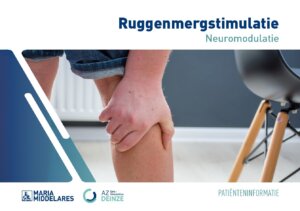Spinal cord stimulation
What is it?
What is it?There are nerves in the body that have 'damage sensors' at the nerve endings. If there is damage somewhere, this will be detected by these nerve endings. These nerves send a warning signal to the pain regulation centre in our brain. We feel this sensation as pain. It is formed in the brain and not at the site where the damage is located. The regulation centre decides how your body should react to the damage/pain.
Chronic pain leads to damage in the spinal cord and in the regulation centre, which means that you no longer react to the signals that the damage sensors send.
You may feel a suddent pain with a slight brush against your skin, or mild pain signals may feel quite strong. The severity of the pain is variable but continuously present and, for that reason, quite debilitating.
Neurostimulation reduces this specific nerve pain. Small electrical currents ensure that someone feels the 'pain signals' less. They can even prevent them from arriving at the control centre. They cause a tingling feeling at the site where you feel the pain, replacing, as it were, the 'painful feeling'.
Treatment procedure
Treatment procedurePreparation
Come to the hospital on the day of treatment. You do not need to be fasted for the treatment. You may eat and drink.
The physician or nurses can provide you with the necessary certificates.
| Medication | Stop | Comments |
|---|---|---|
| Asaflow®, Aspegic® Cardioaspirin®, Aspirin® Dispirl®, Sedergin® | Stop if >500 mg/day | |
| Marcoumar®, Sintrom® Marevan® | Seven days before the procedure | Replace with injections (see Clexane, for example) Anticoagulation before the procedure |
| Ticlid® | ten days before the procedure | |
| Plavix®, Clopidogrel Brilique®, Efient® | Seven days before the procedure | |
| Xarelto®, Eliquis® Lixiana®, Pradaxa® | 48 hours before the procedure | |
| Fraxiparin®, Clexane® Fraxodi® | 24 hours before the procedure | Start taking these again a minimum of six hours after the treatment • Three days afterwards take together with regular blood thinners • Have a anticoagulation follow-up with your GP one week after |
Always inform the physician if:
- you have diabetes or a heart condition
- you are (or could be) pregnant
- you are allergic to certain medication, contrast medium or iodine (disinfectant), latex, etcetera
- you take blood thinners
If you have reduced kidney function, have recently experienced thrombosis or a heart attack or have had a stent implanted, you must contact your attending physician first.
Leaflet
LeafletSee the leaflet below for more information about:
- procedure
- trial treatment
- the possible side effects and complications
- practical tips
- definitive implantation
- frequently asked questions

Brochure ruggenmergstimulatie
DownloadCentres and specialist areas
Centres and specialist areas
Latest publication date: 16/05/2024
Supervising author: Dr Decaigny Veronique



